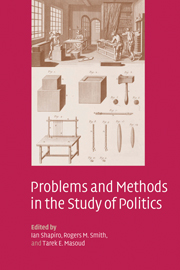Book contents
- Frontmatter
- Contents
- List of contributors
- Acknowledgments
- 1 Introduction: problems and methods in the study of politics
- Part I Description, explanation, and agency
- 2 Problems, methods, and theories in the study of politics, or: what's wrong with political science and what to do about it
- 3 The politics of identities and the tasks of political science
- 4 Political science as a vocation
- 5 The politics of policy science
- 6 The study of black politics and the practice of black politics: their historical relation and evolution
- 7 External and internal explanation
- Part II Redeeming rational choice theory?
- Part III Possibilities for pluralism and convergence
- Index
- References
6 - The study of black politics and the practice of black politics: their historical relation and evolution
Published online by Cambridge University Press: 22 September 2009
- Frontmatter
- Contents
- List of contributors
- Acknowledgments
- 1 Introduction: problems and methods in the study of politics
- Part I Description, explanation, and agency
- 2 Problems, methods, and theories in the study of politics, or: what's wrong with political science and what to do about it
- 3 The politics of identities and the tasks of political science
- 4 Political science as a vocation
- 5 The politics of policy science
- 6 The study of black politics and the practice of black politics: their historical relation and evolution
- 7 External and internal explanation
- Part II Redeeming rational choice theory?
- Part III Possibilities for pluralism and convergence
- Index
- References
Summary
The study of black politics as an academic enterprise evolved within the terms of the segregation era regime, which was congealing around a principle of elite-brokerage as the common sense form of black political activity roughly by the 1920s. (Alain Locke's 1925 anthology, The New Negro, reflected the sensibility of this evolving politics and trumpeted it, and its ideological underpinnings, as a new consensus within the black opinion-leading strata.) I argue here that the academic subfield's formation in the context of that political common sense has been consequential because the discourses shaping academic inquiry have naturalized the premises and worldview of the Jim Crow era black political regime. To that extent, the study of black politics has been an agent in legitimizing and reproducing the regime's presumptions and the politics flowing from them, even into the present, when whatever efficacy it may have had, as explanation or as practice, is exhausted.
Making this argument, first of all, requires establishing the contours of the form of black politics that emerged as hegemonic with the consolidation of white supremacy in the South. I argue that that politics was in part an artifact of the white supremacist regime as well as an adaptation to it. That politics was not the only form of political action that enjoyed a significant constituency among black people during the three decades or so after Hayes-Tilden. Its undergirding political rationality did not necessarily delimit the only form of political activity that could plausibly have become dominant or efficacious.
- Type
- Chapter
- Information
- Problems and Methods in the Study of Politics , pp. 106 - 143Publisher: Cambridge University PressPrint publication year: 2004
References
- 4
- Cited by



